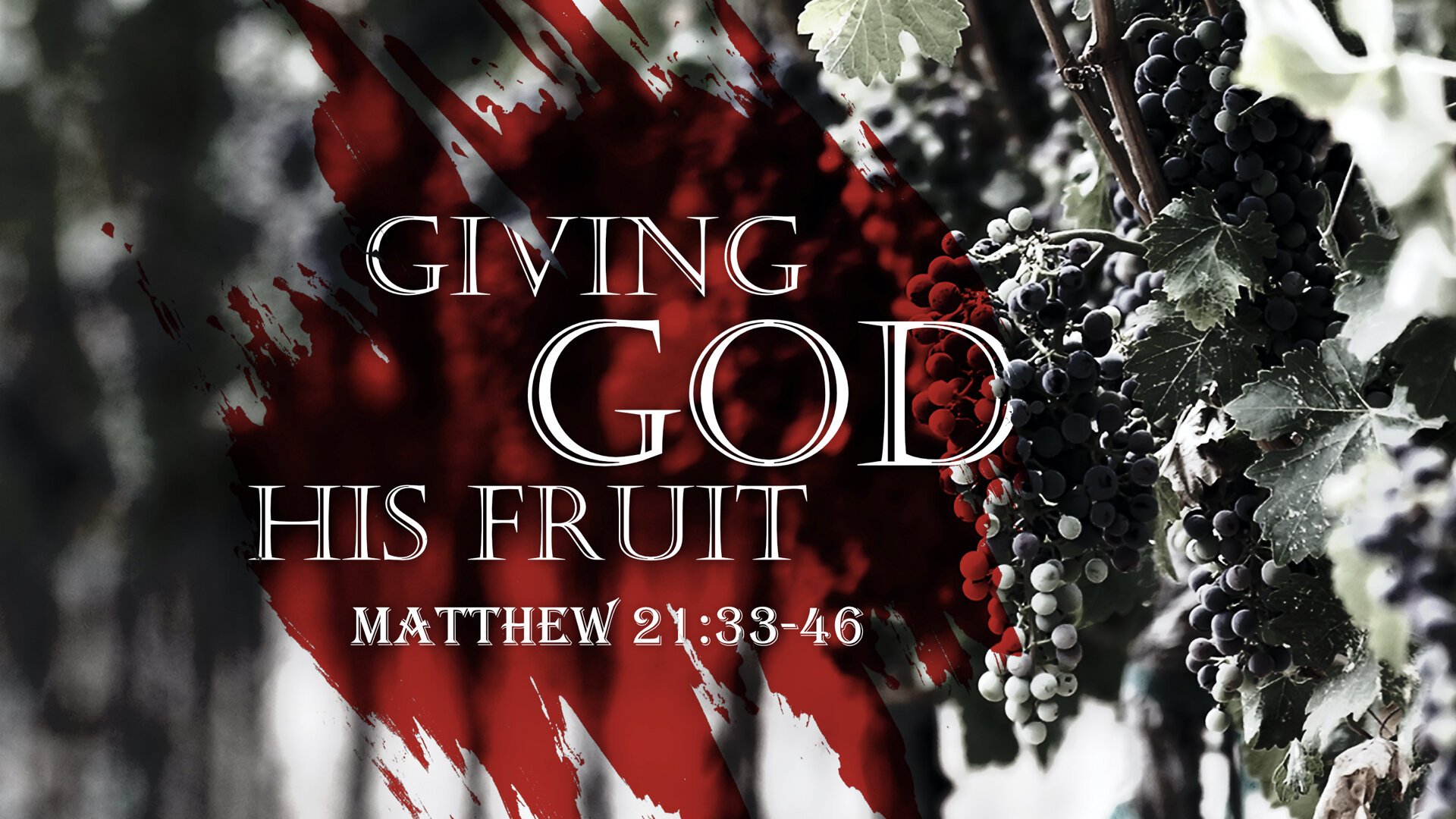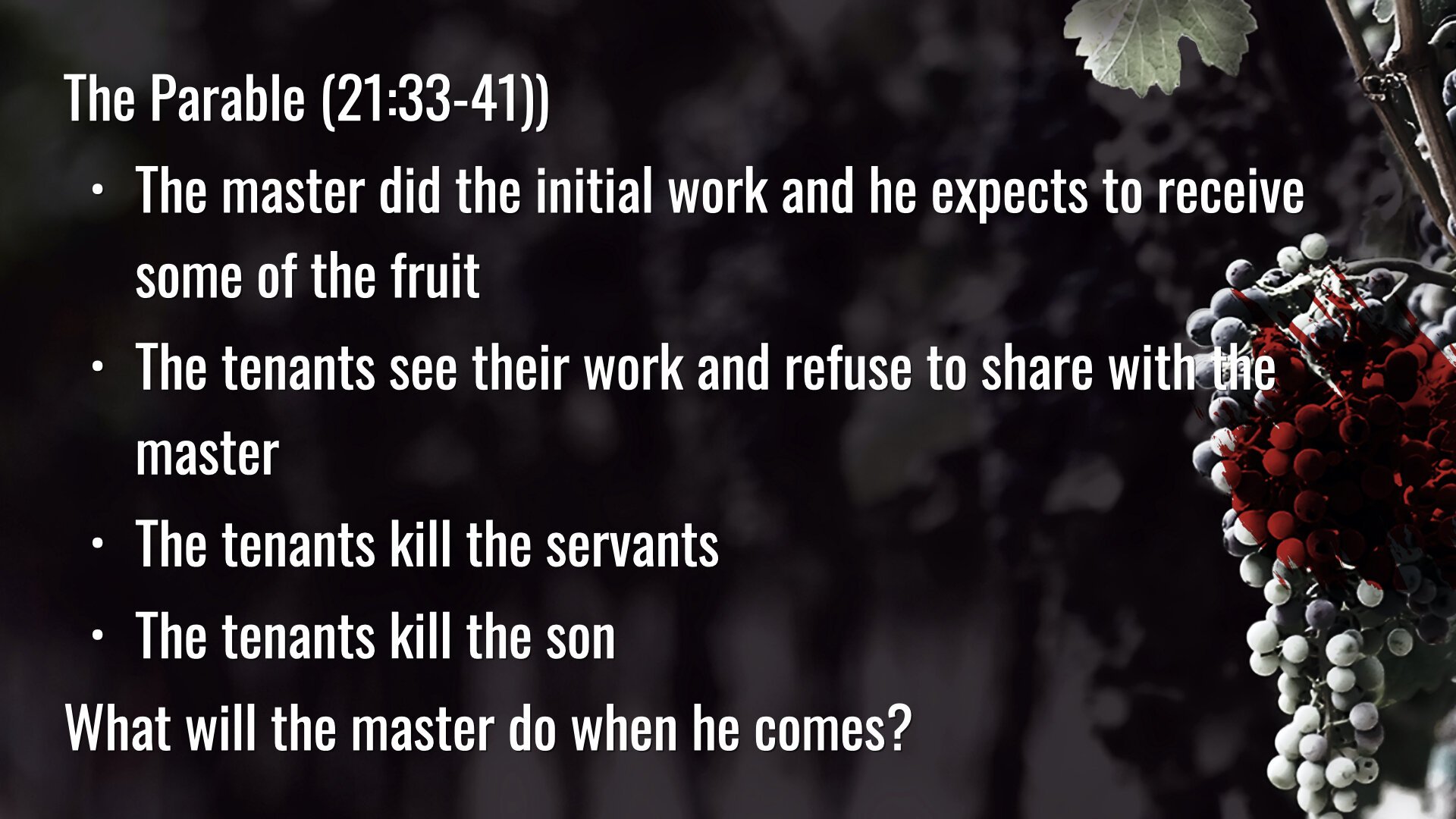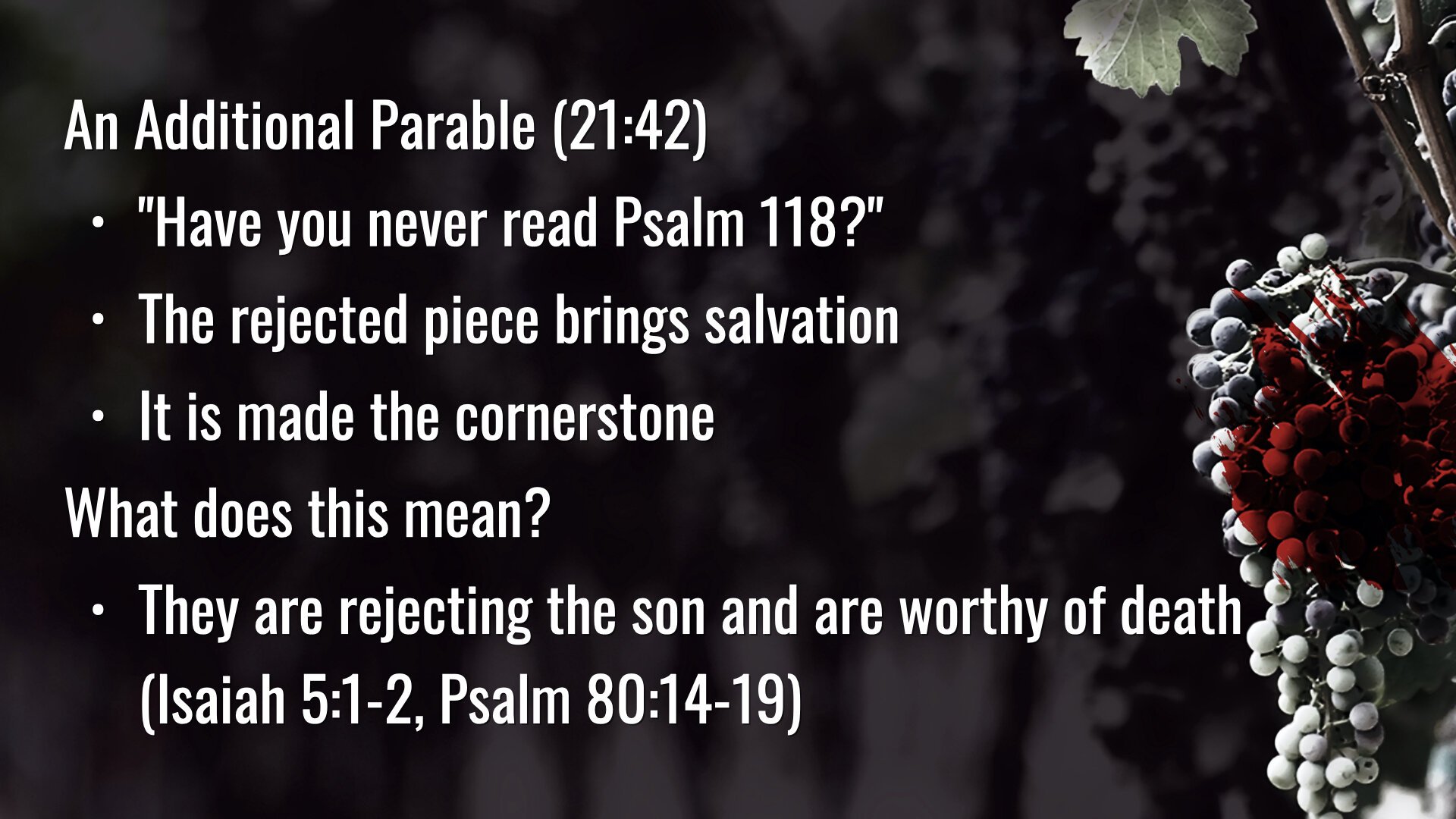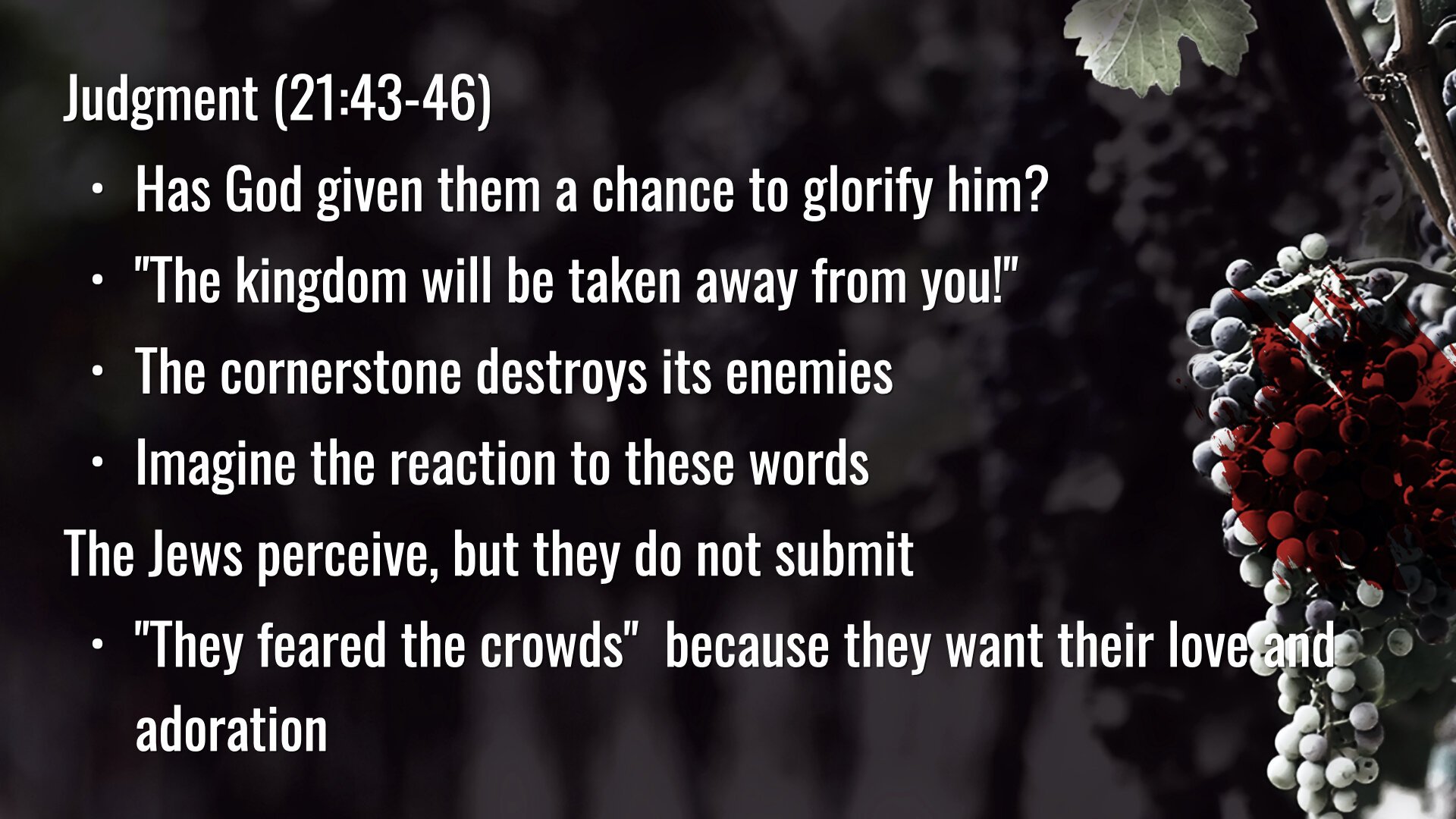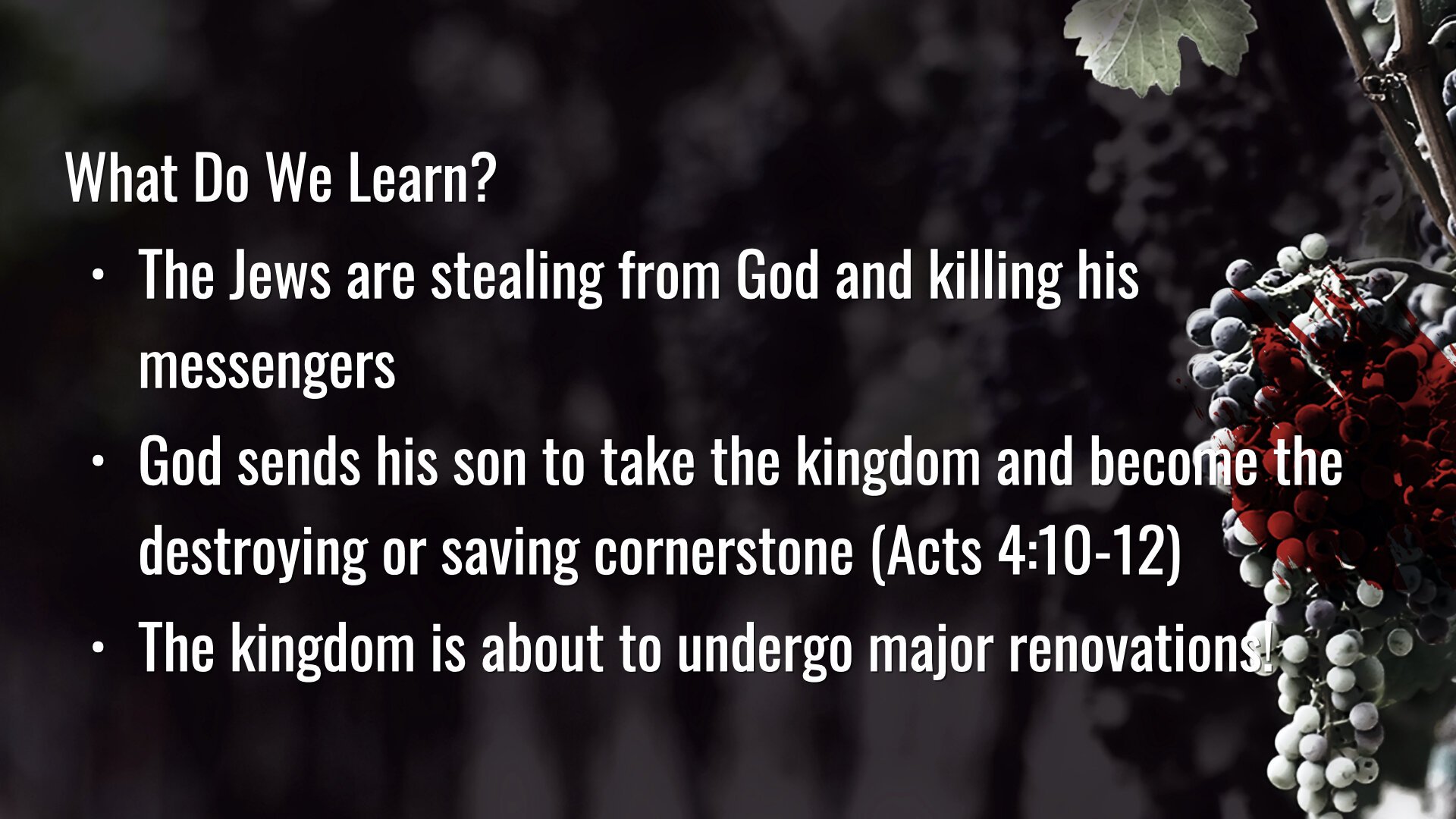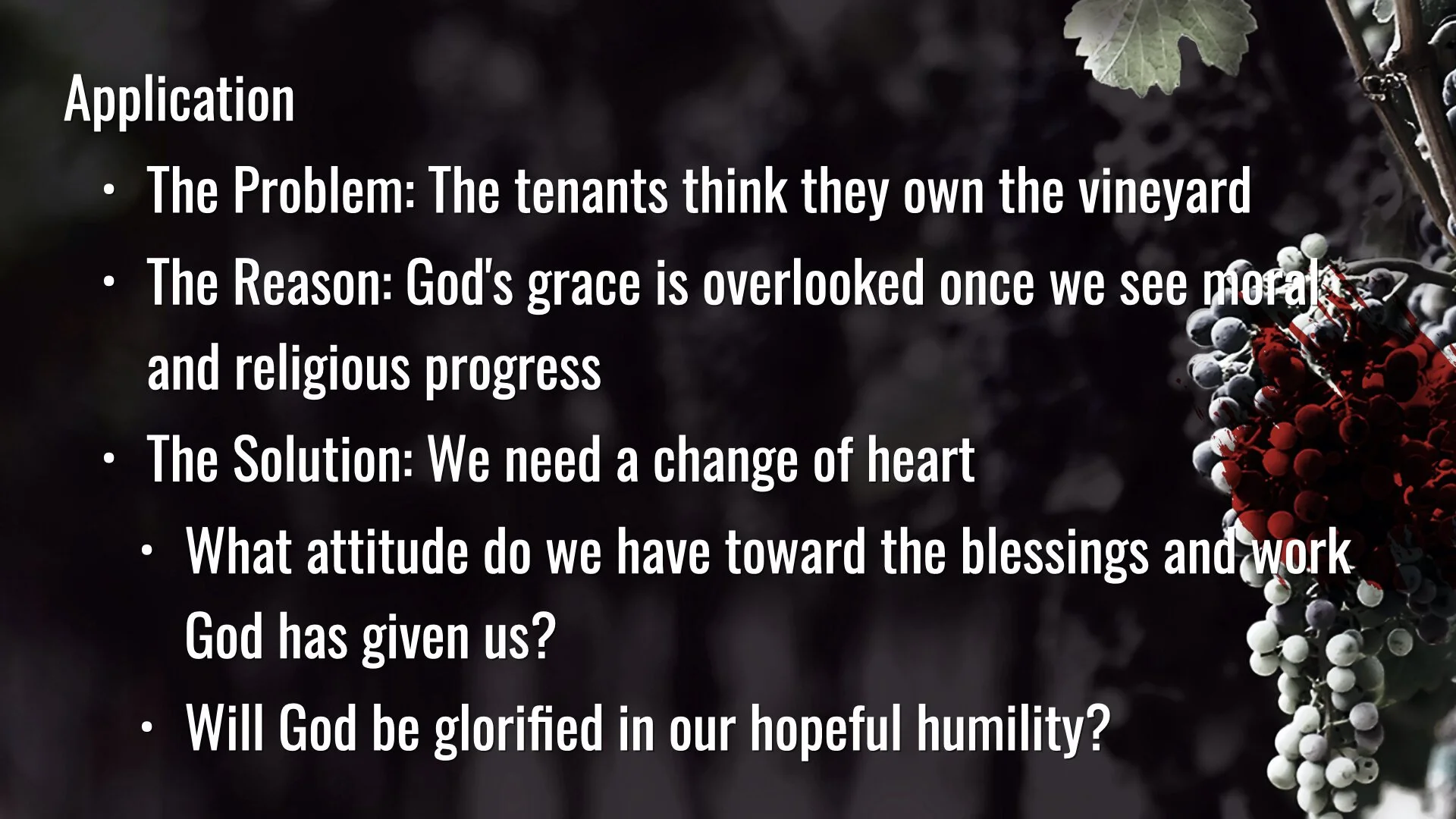Giving God His Fruit (Matthew 21:33-46)
This morning we will be back in the book of Matthew, picking up where we left off in April. In the book of Matthew, we have experienced the journey of Jesus' life over the last year and a half. We have seen Jesus fulfill the scripture and reveal God's will for mankind to be totally transformed from the inside out. He has healed and cast out demons on multiple occasions. Jesus has walked on water, forgiven sins, and multiplied food. He has all power to do as he wishes. But no one believes in him. The disciples have followed him, and they show some level of belief. But he told them on three occasions that he must go to Jerusalem to suffer, die, and be resurrected, and they won't listen. Now he is in Jerusalem, teaching in the temple, and he's helping everyone understand a significant problem that is worthy of God's judgment. There is no fruit.
This is illustrated for us in a miracle that sets this section up. In 21:18-19, he walked to the temple and saw a fig tree full of leaves. But when he walked over to get some figs because he was hungry, he couldn't find any. So he curses the fig tree, and it withers. If you take that story out of context, it makes no sense. You might think, "Even Jesus gets hangry." But that's not it at all. His actions were symbolic. Jerusalem is like the fig tree. It looks full of fruit, but it has none. All of the religion is empty.
The Parable (21:33-41)
Today we are going to look at a parable that describes the root of their problem. We will see the problem, the reason, and God's solution. Let's dig in.
Matthew 21:33--41 (ESV) --- 33 “Hear another parable. There was a master of a house who planted a vineyard and put a fence around it and dug a winepress in it and built a tower and leased it to tenants, and went into another country. 34 When the season for fruit drew near, he sent his servants to the tenants to get his fruit. 35 And the tenants took his servants and beat one, killed another, and stoned another. 36 Again he sent other servants, more than the first. And they did the same to them. 37 Finally he sent his son to them, saying, ‘They will respect my son.’ 38 But when the tenants saw the son, they said to themselves, ‘This is the heir. Come, let us kill him and have his inheritance.’ 39 And they took him and threw him out of the vineyard and killed him. 40 When therefore the owner of the vineyard comes, what will he do to those tenants?” 41 They said to him, “He will put those wretches to a miserable death and let out the vineyard to other tenants who will give him the fruits in their seasons.”
Notice the resemblance of this parable to the fig tree event. In each, you have someone coming in to gather fruit but finding none. This is also closely tied to the parable preceding this, where the father told two sons to go out into the vineyard to work. One said he would but didn't. The other said he wouldn't but did. Today we will tie all of this together.
Here we have a man who sets up a vineyard to be successful. He puts in all the work establishing the vineyard, putting up a fence, digging a winepress, and building a tower. He does everything to ensure that those who tend it will be successful. But, then, he goes away to a faraway country. Why would he do that? He's an investor. He put the work in and went off to work on something else while allowing others to tend his field.
Now the time for there to be fruit comes, and he sends servants to gather the fruit. But the servants aren't given any. Instead, they are given a beating, and some of them are put to death. It is evident at this point that the tenants are evil people. They are handed a vineyard to care for, but they have refused to share the fruit with the one who gave it to them. So the man who owns the vineyard sends more servants to ensure that they will be successful. But, unfortunately, the tenants do the same to them! They refuse to give the vineyard owner what's rightfully his. So he sends his son, thinking that this gesture will result in strict obedience and submission. But, instead, they see it as an opportunity to take the vineyard for themselves. So they take the son outside of the vineyard and kill him as well.
At this point, Jesus asks the penetrating question to the audience, "What will the owner do when he comes?" The people respond with the obvious answer. They say, "He will put them to a miserable death." We can see their sense of justice and their desire to punish those evil people. If it were their vineyard, they probably wouldn't have waited so long to bring that judgment upon them.
Additional Parable (21:42)
Matthew 21:42 (ESV) --- 42 Jesus said to them, “Have you never read in the Scriptures: “ ‘The stone that the builders rejected has become the cornerstone; this was the Lord’s doing, and it is marvelous in our eyes’?
At this point, Jesus responds to them by bringing up scripture. He starts by saying, "Have you never read?" I love that because, of course, they have. Next, he tells them to think about Psalm 118. This is a salvation Psalm that recognizes God's steadfast love and calls for deliverance from their enemies. The answer from God is to take what is rejected and make it a cornerstone. That's kind of odd, isn't it? But it shows a level of wisdom and sophistication that is beyond us. How do you take what is rejected and make it a cornerstone? A cornerstone is the piece of the foundation that everything is built on. In Jerusalem, there is a building with a cornerstone 32'x2'x3' in dimension. The cornerstone is the critical part of the building's foundation because it determines where it will be built. But this piece is rejected. Why would he use it? Furthermore, what does this have to do with the tenants and the vineyard?
What Does It Mean?
In this parable, there is an apparent reference to an Old Testament picture.
Isaiah 5:1--2 (ESV) --- 1 Let me sing for my beloved my love song concerning his vineyard: My beloved had a vineyard on a very fertile hill. 2 He dug it and cleared it of stones, and planted it with choice vines; he built a watchtower in the midst of it, and hewed out a wine vat in it; and he looked for it to yield grapes, but it yielded wild grapes.
In Isaiah, God tells his people that they are a vineyard that he has planted and cared for. There is nothing he hasn't done for them. But they yielded wild grapes so that he will have to destroy them. Israel is the vineyard.
Psalm 80:14--19 (ESV) --- 14 Turn again, O God of hosts! Look down from heaven, and see; have regard for this vine, 15 the stock that your right hand planted, and for the son whom you made strong for yourself. 16 They have burned it with fire; they have cut it down; may they perish at the rebuke of your face! 17 But let your hand be on the man of your right hand, the son of man whom you have made strong for yourself! 18 Then we shall not turn back from you; give us life, and we will call upon your name! 19 Restore us, O Lord God of hosts! Let your face shine, that we may be saved!
In this Psalm, the Psalmist points out that God planted Israel to be his vineyard, but now he is destroying it. So he calls for God to restore what he has destroyed.
So Jesus is telling them something they know a bit of. They are familiar with this idea of God having a vineyard. Now he brings in tenants who are supposed to give God fruit. But they refuse. This is an apparent reference to the spiritual leaders of Israel. They are seeking glory for themselves and refusing to give God the glory.
Their murder of the son is a reference to their rejection of Jesus. He is the rejected stone that God will make the cornerstone.
Judgment (21:43-46)
The last section explains why Jesus gave these parables.
Matthew 21:43--46 (ESV) --- 43 Therefore I tell you, the kingdom of God will be taken away from you and given to a people producing its fruits. 44 And the one who falls on this stone will be broken to pieces; and when it falls on anyone, it will crush him.” 45 When the chief priests and the Pharisees heard his parables, they perceived that he was speaking about them. 46 And although they were seeking to arrest him, they feared the crowds, because they held him to be a prophet.
The Jews have been given every opportunity to produce fruit for God. God has done everything to make them to the praise of his glory, but they refuse to submit and give God the glory. So now Jesus tells them that God will move them out of the way so other people can come in and produce fruits for God. He says, "the kingdom of God will be taken away from you." Can you imagine hearing this in the temple? This is a scathing judgment against the Jews, and especially the leaders.
In verse 44, he makes himself out to be indestructible and the cause of much destruction. Those who think that Jesus just came teaching lovey-dovey stuff are entirely overlooking the intense judgment we are about to get into this section of the gospel. Jesus tells the Jews that God will destroy them for this great evil. They can see the judgment that is due to them in this parable. If they reject the son and selfishly kill him, they are not worthy of surviving the judgment to come.
The last two verses of this Chapter are shocking. The leaders hear the parable, perceive that he is speaking about them, and want to arrest him. There is no consideration of whether what he says is true or not. There is only hatred toward him for speaking out against them. But Matthew tells us that Jesus has them in a difficult position. They cannot arrest him without giving up some of their glory. But, if they do, they will lose glory from the people who think Jesus is a prophet.
What Do We Learn?
The Jews have been worthy of destruction throughout the Bible. They have taken all that they can get from God, and when he sends his prophets to help them glorify God, they kill them. At that point, we would have been done with the people, but instead of destroying the people, God sends them his son. This makes no sense to us. Why risk the son? Why believe that will make a difference? But God wants to make the rejected son into the one thing that will turn their hearts in the right direction. God knows what he is doing.
Acts 4:10--12 (ESV) --- 10 let it be known to all of you and to all the people of Israel that by the name of Jesus Christ of Nazareth, whom you crucified, whom God raised from the dead---by him this man is standing before you well. 11 This Jesus is the stone that was rejected by you, the builders, which has become the cornerstone. 12 And there is salvation in no one else, for there is no other name under heaven given among men by which we must be saved.”
In Acts, we see the apostles proclaiming that God has made Jesus, whom they crucified, to be the Lord, savior, and king. He shows tremendous grace to those evil people.
Kingdom Transitions
At the same time, this rejection will result in a total transformation of the kingdom of God. It will no longer be controlled by those who seek their own glory. The proud will have no place in this kingdom. God is only giving this kingdom to the poor in spirit who gives him his fruit in its season.
If we go back to the previous parable, we can see that it's not those who say they will do God's will that are accepted. It's those who do God's will. Even if they previously showed some level of rebellion, God can accept them if they turn and submit. This kingdom is going to be full of tax collectors and prostitutes. It will not have many who are rich and powerful.
Application
The Problem
When we look at this, we see a significant issue in Judaism and Christianity. The tenants think they own what they tend to. They believe that the vineyard is more theirs than God's because of the work they have put in. God gives them a kingdom, and once they start working in it, they think they own it. Do you see how easy that is to fall into? How many of us think that we deserve something for all the work we put in. If we worked hard in that vineyard to produce a bumper crop, we might look at the one who set it up and left like he's crazy when he comes asking for his cut.
The Reason
Often, we receive the grace of God and think that we need to do a lot of religious and moral things to gain some ground to stand on. We can't stand the feeling of helplessness. We can't stand our need for God to do everything for us. We want to do something for ourselves. But all of that religious and moral work makes us feel like God owes us something. We think, "I've sacrificed so much!" It also makes us feel superior to others so that we can look down on them. We learn a little bit of righteousness, and we assume that we are righteous on our own. We own it.
Why do we do that? We want to own the vineyard so that we can have the freedom to do whatever we want. If God still owns it, we have to do what he wants.
The Solution
The workers in the vineyard must recognize that everything they have to work with has been given to them. Without the establishment of the vineyard, they would have nothing. We need to do the work out of gratitude, with a desire to glorify the vineyard owner. We need to submit to a life of service. We need a willingness to do anything and everything that God commands without expecting anything in return. Religion and moral correction are not about having God owe us something. They are not about gaining freedom to do what we want to do. Ownership is an illusion. Freedom is an illusion. We can either use what God owns to his glory, or we can use it like it's ours and be evil. There is no alternative. What do we have that we did not receive?
This might make God sound like he is some kind of slave driver. But if you know him, you know that is far from true. We need a hopeful humility as we work for him. We know that nothing we have is our own, but we know the one we work for is gracious. He gave his son to turn us back when we deserve destruction. That makes no sense to us, but it shows us how great his love is. Will he not give a reward to those who work for his glory with humility? It's not about working to earn something. We don't deserve anything but death. But God not only wants to get us working for his glory. The Bible tells us that he wants to glorify us. He wants to give us more than we could ever experience by working for our own glorification. He promises to do that for us. We just need to trust him and put our hope in him as a good master who rewards his people. Accept the cornerstone. Accept the one who owns everything you enjoy. Please don't rely on your religion and work as though they earn you anything. Instead, work as though you could never do enough. Please don't fail to give him glory! Be grateful for his patience and graciousness toward you. He wants us to be what he created us to be. He wants us to fulfill the purpose he created in us. If we seek ownership of our lives and freedom from serving God with everything, we will only find slavery to sin and slavery to a search for meaning.

